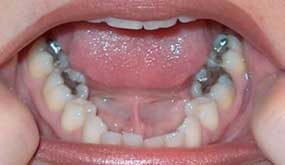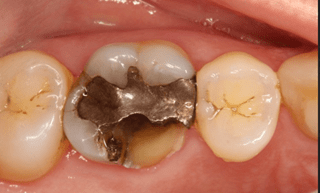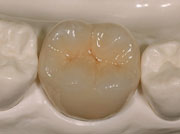
We have lots of great ways to fix your broken teeth! In fact, broken teeth is kinda what we do.
Why Do Teeth Break?
Old Fillings
Dental fillings, especially large ones, can have a weakening effect on teeth. Dental fillings rely on a tooth’s remaining structure to hold and support them. Fillings, in general, don’t strengthen a tooth and can’t protect a tooth from the forces generated by biting and chewing. If only a small amount of tooth decay is present then it’s usually no problem to make a repair. In these cases there will still be lots of healthy tooth structure remaining after the decay has been removed and the filling has been put in place. On the other hand, repairing a large cavity often requires the removal of so much tooth structure that the overall strength is reduced. This is because the tooth is no longer as intact as it once was, its structural integrity has been compromised. Think of it like sawing halfway through a piece of wood. You would expect it to be weaker where it was cut. This weakness leads to breakdown of the tooth and filling and we often see new decay happening earlier around larger fillings. All of this leads to broken teeth.
How Big are Your Fillings?
By now you may have already looked in the mirror so you can judge the size of the dental fillings in your teeth. Did you see any “large” ones? Now, ask yourself how long those big fillings have been in place. Was your answer two years, five years, or longer? If teeth with big fillings are so weakened, why haven’t parts of these teeth already fractured off? The answer is that we can’t know for certain which teeth will develop problems and which teeth won’t. Clearly not every tooth with a “large” filling will break. Many people get many years of service out of these “large” restorations. Additionally, not every tooth that does crack or break will be especially problematic to repair. If we believe you are at risk for broken teeth in the long run, we might suggest a comprehensive plan to prevent them.
Trauma
A good hit to the face with an elbow or a ball in sports can lead to broken teeth. We commonly see unrestrained passengers in automobile accidents who have broken teeth as well. Trauma does not have to be so obvious however. Have you ever bitten down on a pitted olive or cherry only to wince in pain when you accidentally hit a fragment of the pit? Many times patients get broken teeth from small stones or shells or other objects in their food. Honestly, after nearly forty years of eating, we still sometimes bite accidentally on our forks. These seemingly small events can have a large impact on our teeth, causing trauma.
Oral Piercings
Placing metal studs or bars in your mouth will lead to broken teeth. Despite the “coolness” factor, we often repair the consequences of piercings. Most of them don’t think their piercing was worth the trouble once their expensive repairs are completed. While we can’t say what’s right for everyone, we can and will explain the risks to you if you come to us with oral piercings. If you do have one, try your best to avoid smacking it against your teeth or biting down on it. You can also try plastic jewelry instead of metal. These are the main causes of breakage.
Occlusal Disease
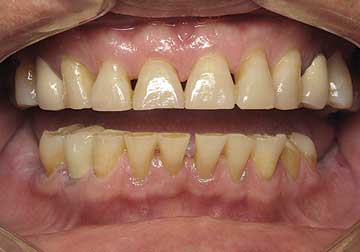
What if I Ignore My Broken Tooth?
In most cases, a broken tooth is not a catastrophic event but your broken tooth will certainly decay or crack more if you ignore it.
In many cases you may not even be aware that a crack has formed unless a portion of your tooth has broken off. This is because cracks are difficult to see and not all tooth cracks produce symptoms. While not all cracks will lead to problems immediately, cracked tooth symptoms, or a problem with your tooth’s nerve may develop in the future. On the other hand, some broken teeth can be sensitive. Biting pressure can separate the portions of the tooth associated with each side of the crack and trigger a painful response. The classic sign of a cracked tooth is that there is a sudden sharp pain from the tooth when you bite down. The pain then subsides immediately once you have released your biting pressure. The pain may not be produced every time you close. Sometimes it takes biting at just the right angle. While cracks in teeth do not heal, cracked tooth symptoms can subside. If you anticipate that you do have a tooth that has cracked you should have it checked.
Sometimes, a piece of your tooth will actually come off. The piece can break away cleanly or the piece will be loose but still stuck in the gum. The amount of pain associated with a tooth that has broken can vary widely depending on the situation. Sometimes these teeth are totally asymptomatic. Other times, they may be sharp or rough to your tongue or cheek. They can have increased sensitivity to hot and cold stimuli and can be painful to biting pressure.
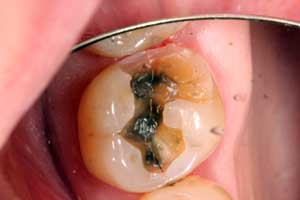
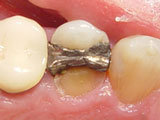
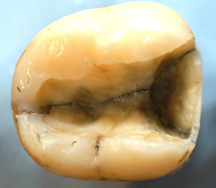
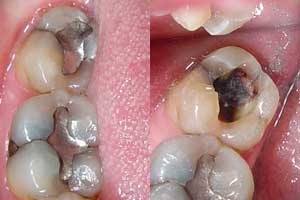
More serious broken teeth require more involved dental treatment to repair them. If the piece of the tooth that has broken off includes part of the tooth’s root a type of gum surgery termed “crown lengthening” may be needed before a dental crown can be placed. This is because the edge of a dental crown needs space to keep the gum healthy. Deep tooth cracks or extensive tooth breakage may require perform root canal treatment before a dental crown can be placed. Surprisingly, even teeth that have broken off flat with the gum line can usually be rebuilt. We can often use root canal, crown lengthening and crowns but we must always keep our eyes on the final results that we want. The more procedures required, the less predictable the final outcome becomes. More importantly, these procedures are expensive and, if we choose them, we want them to work for a long time.
Sometimes a tooth breaks or is damaged to the point that it cannot be repaired. If a crack or break involves a large portion of the root portion of the tooth (the portion way down underneath the gum line), we may find that no dental treatment will work. Other times, cavities may extend down beyond the level of the bone and too far for crown lengthening to be effective. In these cases, the broken tooth must be extracted.

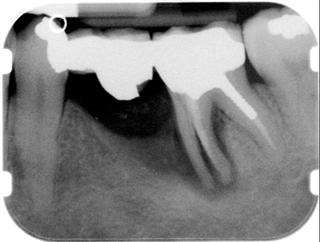
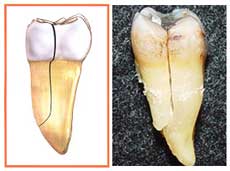
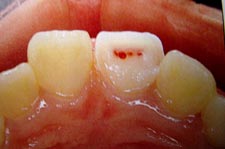
What Can You Do?
Dental Crowns
Discover the benefits of Dental Crowns in Matthews, NC! Dental crowns, also known as dental caps, are versatile restorations used to rebuild root-canal treated, broken, or decayed teeth. These crowns can enhance both the strength and cosmetic appearance of your teeth. They are available in various materials, including porcelain, gold, and porcelain-fused-to-metal options. Whether you need to restore a damaged tooth or improve your smile, dental crowns may be the solution. Learn more about Dental Crowns in Matthews, North Carolina today! Click Here
Dental Fillings
Explore the world of Dental Fillings in Matthews, NC! Dental fillings are a crucial dental procedure used to restore teeth affected by decay, cavities, or minor damage. They come in various materials, including amalgam, composite, ceramic, and gold fillings, providing a range of options to suit your specific needs. Our dedicated dental professionals ensure a careful assessment, precise material selection, and expert placement to revive the strength, functionality, and aesthetics of your teeth. By maintaining proper oral hygiene and regular check-ups, you can extend the lifespan and durability of your dental fillings in Matthews NC. Contact us today to schedule a consultation and experience our exceptional dental fillings service. Click Here


